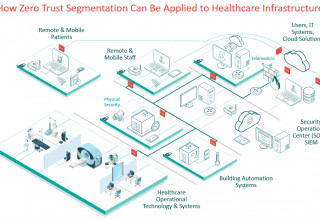Largest Healthcare Data Breaches Reported in February 2022 Confirms Need for Network Security Based on Zero Trust Microsegmentation

MCLEAN, Va., March 31, 2022 (Newswire.com) - Cybersecurity continues to remain a top priority for healthcare leaders, as 2021 was the worst year to date on healthcare record breaches, with nearly 45 million records being exposed or stolen in a record 686 major breaches. Stolen healthcare records are the source of 95% of all identity theft and are worth 25 times as much as a credit card. Onclave Networks, an enterprise network security innovator, recommends healthcare organizations adopt Zero Trust Microsegmentation to better protect against costly network breaches and ransomware.
"The expansion of the healthcare network perimeter has become impossible for traditional IT solutions to monitor and secure," said Scott Martin, chief marketing officer for Onclave Networks. "Healthcare IT systems have grown increasingly vulnerable to attack as the growth of networked medical devices, like patient monitors, exponentially increases the endpoints that cybercriminals can attack."
Consider the following healthcare industry insights:
- Hospitals can have as many as 15 to 20 networked devices per bed.
- Large hospitals can have as many as 85,000 non-IT medical devices.
- 93% of healthcare organizations experienced a data breach, while 57% of healthcare organizations have had more than five breaches in 2021.
Technology consultancy Gartner predicts that by 2023, the average CIO will be responsible for more than three times the number of endpoints they managed in 2018 and that most healthcare CIOs and CISOs lack an up-to-date, complete and accurate inventory of the devices in their systems.
As a recognized expert in healthcare cybersecurity solutions, Onclave is well-positioned to protect healthcare's expanding network perimeter as a result of technological advancements and platforms associated with telehealth and remote patient monitoring while addressing HIPAA and HITECH compliance requirements.
Onclave is a key contributor to The National Institute of Standards and Technology (NIST) and National Cybersecurity Center of Excellence (NCCoE)'s February 2022 report, "Securing Telehealth Remote Patient Monitoring Ecosystems." (SP 1800-30). The report is the final guidance to healthcare organizations on the risks associated with remote patient monitoring architecture and is intended to ensure healthcare organizations are involving people, process, and partnering with appropriate integrated platform providers to implement a holistic risk-mitigation strategy.
Traditional IT cybersecurity solutions lack visibility into all systems and devices connected to the network and use detection as a defensive perimeter, which doesn't protect from breaches and lateral movement of bad actors throughout the network.
Onclave's agentless solution is designed to work as an overlay with new and existing network infrastructures. The Onclave TrustedPlatform™ applies the recommended NIST cybersecurity framework and leverages Zero Trust Microsegmentation. Identifying all endpoints on the IT network, the TrustedPlatform™ protects converged networks by cryptographically separating and securing OT and IoT devices from the IT network. This eliminates entry points for intrusion, isolates and contains unauthorized access and continuously monitors and reassesses trust - preventing attacks instead of identifying and reporting them.
"By leveraging Onclave's technology, healthcare leaders can bring value to their organizations by providing medical device (IoMT and IoT) security, protecting remote patient monitoring, and securing workloads on-premises and in the cloud," Martin said.
As cyberattacks continue to hit the Healthcare sector in 2022, the U.S. government has drastically stepped up the publication of federal guidance. In fact, Senators recently introduced the bipartisan Healthcare Cybersecurity Act (S.3904), which aims to promote collaboration between CISA and HHS to enhance cybersecurity efforts across the sector. Also, a recent memo outlined a 2024 timeline for Federal organizations to implement a zero-trust security strategy.
As sophisticated threat actors continue their attempts to maneuver enterprise firewalls through connected devices and systems, healthcare security architects, IT professionals and leaders should address these attack vectors by prioritizing the hardening of systems through network segmentation.
"Onclave supports healthcare in protecting their facilities and supply chain communications," Martin said. "With our TrustedPlatform™, we eliminate the attack surface area for connected medical devices and systems, while simplifying management and reducing costs."
Contact Onclave to learn more or schedule a demo.
About Onclave Networks, Inc.
Onclave Networks, Inc. (McLean, VA) is a global cybersecurity leader securing new and legacy Operational Technology (OT) and IoT/IIOT devices including those using 5G. Onclave dramatically reduces cyberattack surfaces, breaches, network complexity, and costly overhead created by shared infrastructure - enabling a more efficient and secure way to operate and communicate. Delivering an integrated solution based on Zero Trust Microsegmentation and leveraging proven methodologies used by the DoD, Onclave is well-positioned to protect vulnerable endpoints across all sectors, on-prem and in the cloud. Onclave brings real trust to communications by securing networks from edge to cloud.
Media Contact
Savannah Muir
savannah@newswire.com
Source: Onclave Networks, Inc.


